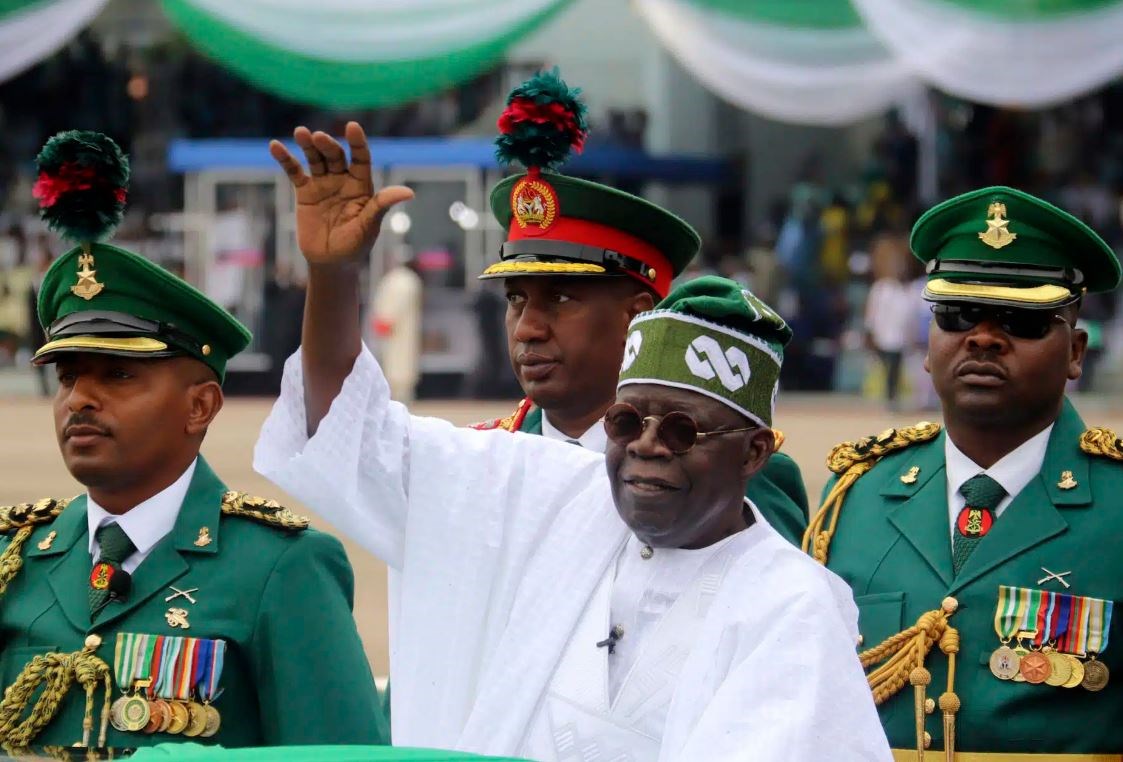Opposition appeal against Nigerian Tinubu's presidency rejected
An appeals court has dismissed petitions lodged by opposition parties challenging the validity of President Bola Tinubu's victory in the February election.
-

Nigeria's new President Bola Ahmed Tinubu, center, inspects honor guards after taking an oath of office at a ceremony in Abuja, Nigeria, on May 29, 2023. (AP)
An appeals court in Nigeria has rejected petitions from opposition parties challenging the legitimacy of President Bola Tinubu's victory in the February election. The court ruled that the political parties failed to provide sufficient evidence that prove their claims of voting irregularities amid their questioning of Tinubu's eligibility.
Three opposing parties contested the election results, arguing that they were improperly announced and that Tinubu did not meet the qualifications to run for president, citing his Guinean citizenship and lack of academic credentials. While the opposition rejected the ruling, they have not yet announced whether they will appeal, as they have a 60-day window to do so at Nigeria's Supreme Court.
In Abuja's Court of Appeal, a five-member panel of judges dismissed most of the arguments presented by the opposition parties, citing a lack of credible evidence. The court also rejected a petition by the Allied Peoples Movement seeking to nullify Tinubu's victory based on his running mate's nomination.
Furthermore, the court dismissed claims that Tinubu's Guinean citizenship disqualified him from running for president, stating that the opposition could not substantiate their argument. The panel failed to provide evidence to support the claim that Tinubu had been previously indicted on drug charges in the United States, which would have disqualified him from running for the presidency.
Tinubu, currently attending the G20 summit in India, has denied all allegations made by the petitioners.
The court's ruling was met with heightened security in Abuja, where various support groups demonstrated in solidarity with their respective political parties, calling for a fair judicial process.
The tribunal has the authority to uphold Tinubu's election win, declare another candidate as the winner, annul the vote, or call for a new election. Had the judges upheld the petitions and annulled the presidential election, it would have been a historic event in Nigeria's history.
Police in Abuja issued a statement urging citizens to be cautious in their actions and statements, emphasizing a zero-tolerance policy toward activities that incite violence.
It is worth noting that Tinubu secured victory in the election with less than 50% of the vote, marking a first in Nigeria's electoral history. While the election was considered an improvement from the 2019 election, critics pointed out delays in the announcement of results that may have allowed for tampering.
Read more: US tweeting for 'free, fair' elections sparks concern among Nigerians
Since assuming office, Tinubu has introduced economic measures aimed at reforming Nigeria's struggling economy. However, these measures have faced criticism for exacerbating the hardships faced by millions of impoverished Nigerians.
Recently, Nigeria Labor Congress workers staged a two-day "warning strike" to protest rising living costs due to the removal of gas subsidies, threatening to "shut down" the nation's largest economy if their demands for improved welfare were not met. The Nigerian government called on citizens to exercise patience, emphasizing that the current inconveniences were necessary to save the country from economic challenges.
Read more: Tinubu admits war in Africa not in interest of Nigeria, continent

 3 Min Read
3 Min Read








